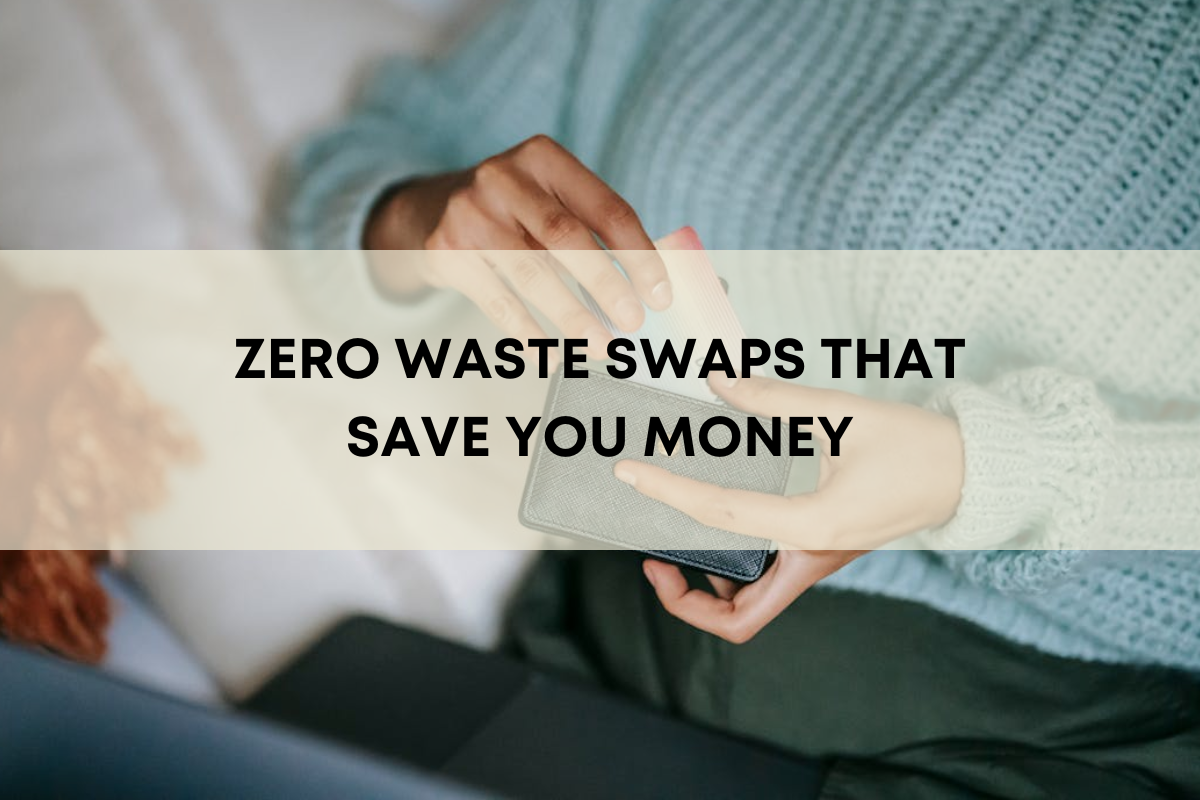Zero Waste Swaps That Save You Money

This month we’re diving into the topic of how going low or zero waste can save you money. I love this topic because, a) everyone likes to save their pennies, and b) who wants to pay more for trash, right?
In today’s world, many products are designed to be linear. That is; we buy them, we use them and then we throw them away at the end of an often short lifespan. This leaves us as consumers back at square one; having to constantly re-buy products that we’ve used only once or just a few times. I’m sure you can think of plenty of examples: cotton balls, Q-tips, Ziploc baggies, parchment paper…. the list goes on.
Having to replace even cheap everyday items can add up financially. Not to mention you also have to buy the garbage bags, pay for your waste to be hauled away, etc. And the worst part is, many of these products will never decompose.
Let’s consider the alternative to single use items (aka sustainable/reusable/low waste/zero waste products). Some of these will have a larger upfront investment, but will save you money over time because they’re meant to last rather than be tossed away and replaced again and again. This requires you to think about some purchases with a different mindset; to recognize them as the longer-term investments they are.
Stainless steel safety razor vs. Generic plastic razor
Say, for example, that you typically use a plastic razor at home. This probably costs $5-10 upfront, and might have a few disposable refills thrown in with your initial purchase. In about eight weeks you will use up the disposable refills and they will go straight into your trash. Then you will have to buy more disposable heads, which can be upwards of $20 for a pack of four. You are locked into a continuous cycle of having to buy more replacement heads.

What if you were to invest in a better alternative that saves you money and doesn’t contribute to the landfill? Say a safety razor, like these Bareaya or Albatross models that take a stainless steel razor blade. The razor itself is a larger upfront cost than it’s plastic counterpart, but once you’ve made the switch you can ditch expensive plastic refill heads for LIFE. The only thing you will need to replace are the steel blades, which costs just cents each. The best part is that stainless steel razor blades refills are 100% recyclable (yahoo!). So not only do you save money, you save trash from being generated. (Fun fact: you can drop your old stainless steel blades at Tare Market and we’ll send them to Albatross to be recycled into silverware!).
Single-Use Face Rounds vs. Reusable Face Rounds
You know those disposable cotton rounds you throw away after a single use? Why not replace them with something designed to last you a lifetime. Take these super-cute face rounds for example. A 20 pack will set you back $15.99 and they should last you practically forever. Use them for whatever you like, toss them through a wash and they’re ready to go again and again. On the other hand, if you buy disposable cotton rounds, a pack might only cost about $3.50 upfront – but you need four to five packs a year. At that rate, the reusable face rounds are already becoming better value for money, especially if you’re using several a day. Once you get beyond a year, reusable face rounds beat disposable hands down for value.
Single-Use Q-Tip vs. Reusable Last Swab
Think of the same scenario with cotton swabs: something that we tend to consider a dime a dozen for good reason; a box of 500 will only set you back about $4. Maybe this is why we throw away literally millions of disposable swabs a day without even thinking about it. But what if for the price of three boxes of disposable swabs you could buy a silicone LastSwab intended to be reused for life? These are designed for you to only have to buy them once, and they won’t generate waste in your bathroom every single day. Whether you use a LastSwab to clean your ears or touch up makeup, once you’ve reused it year after year it works out as better value for money than replacing disposable swabs. You can tick them off your shopping list and never spend another cent on them. Plus, think of all the precious bathroom cabinet space you could free up by not having a whole box of plasticky swabs laying about.

Disposable Paper Coffee Filters vs. Reusable
Now, how about in the kitchen. Are you making your morning cup of coffee with a single-use paper filter? If you’re drinking a daily cup of joe then consider investing in a set of reusable Coffeesocks. These go for $12.99 for a set of two, and can be rinsed, dried, and reused again and again. A set of 100 disposable paper filters, on the other hand, is around $4 depending on the size and shape of the filter. At one filter a day, by the end of a year the two options are roughly the same value for money, but one generates waste while the other does not. Extend this calculation beyond a year and the Coffeesock clearly comes out on top for value. Not only are they organic and easy to clean between uses, unlike their paper counterparts, Coffeesocks will last for hundreds of brews and aren’t made with toxic chemicals. Besides, there’s nothing worse than going to make your morning coffee and realizing that you’re out of filters….

I hope this has given you some inspiration to see your zero waste swaps as investments that can help you to cut down on consumption and save money over the long-run. Remember: reducing and reusing is often cheaper than continually replacing, and definitely better for the environment!
Learn more about the mission of the creators of the LastSwab here.
Watch a how-to video on how to use CoffeeSocks and the benefit here.
Recent Blog Posts
Discover more tips on living #ZeroWaste!
-

How to Celebrate Earth Month: 10 Actions to Make a Difference
Earth Month is the perfect time to take action for the planet. In this post, we share 10 simple actions you can take this month to celebrate Earth Month and reduce your ecologic...
Read more -

Why Choose a Plastic-Free, Zero-Waste Lifestyle?
Plastic waste is everywhere, but small swaps can make a big impact. Reduce single-use plastic, shop in bulk, and choose sustainable alternatives. Tare Market is here to help you...
Read more -

Celebrating Women Makers: Women-Owned Brands at Tare Market
Celebrate International Women’s Day with Tare Market by supporting women-owned brands that are making a difference in sustainability and entrepreneurship. From eco-friendly clea...
Read more



